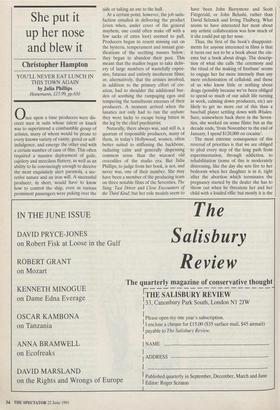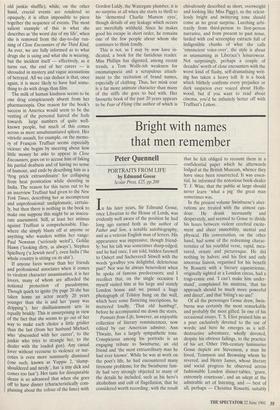She put it up her nose and blew it
Christopher Hampton
YOU'LL NEVER EAT LUNCH IN THIS TOWN AGAIN by Julia Phillips Heinemann, £15.99, pp.650 Once upon a time producers were dis- creet men in suits whose talent or knack was to superintend a combustible group of artistes, many of whom would be prone to every known variety of vanity, greed or self- indulgence, and emerge the other end with a certain number of cans of film. This often required a massive deployment of guile, cajolery and merciless flattery, as well as an ability to lie convincingly enough to deceive the most exquisitely alert paranoia, a sec- retive nature and an iron will. A successful producer, in short, would have to know how to control the ship, even as various prominent passengers were puking over the side or taking an axe to the hull.
At a certain point, however, the job satis- faction entailed in delivering the product (even when, under cover of the general mayhem, one could often make off with a few sacks of extra loot) seemed to pall. Producers began to resent missing out on the hysteria, temperament and instant grat- ifications of the seething masses below ; they began to abandon their post. This meant that the studios began to take deliv- ery of large numbers of wastefully expen- sive, fatuous and entirely incoherent films; or, alternatively, that the artistes involved, in addition to the primary effort of cre- ation, had to shoulder the additional bur- den of soothing the rampaging egos and tempering the tumultuous excesses of their producers. A moment arrived when the lunatics not only had to run the asylum: they were lucky to escape being bitten in the leg by the chief psychiatrist.
Naturally, there always was, and still is, a quorum of responsible producers, many of them, in today's Hollywood, women, often better suited to stiffening the backbone, radiating calm and generally dispensing common sense than the wizened old crocodiles of the studio era. But Julia Phillips, to judge from her book, is not, and never was, one of their number. She may have been a member of the producing team on three notable films of the Seventies, The Sting, Taxi Driver and Close Encounters of the Third Kind; but her role models seem to have been John Barrymore and Scott Fitzgerald, or John Belushi, rather than David Selznick and Irving Thalberg. What seems to have interested her most about any artistic collaboration was how much of it she could put up her nose.
Thus, the first of the book's disappoint- ments for anyone interested in films is that it turns out not to be a book about the cin- ema but a book about drugs. The descrip- tion of what she calls 'the ceremony and the ritual of the making of freebase' seems to engage her far more intensely than any mere orchestration of celluloid; and those of us who know little or nothing about drugs (possibly because we've been obliged to spend so much of our adult life turning in work, calming down producers, etc) are likely to get no more out of this than a baseball player settling down with Wisden. Sure, somewhere back there in the Seven- ties, she worked on some films: but as the decade ends, 'from November to the end of January, I spend $120,000 on cocaine'.
The most extreme consequence of this reversal of priorities is that we are obliged to plod every step of the long path from experimentation, through addiction, to rehabilitation (some of this is moderately distressing, like the day she sets fire to her bedroom when her daughter is in it, right after the abortion which terminates the pregnancy started by the dealer she has to throw out when he threatens her and her child with a loaded rifle: but mostly it is the old junkie shuffle), while, on the other hand, crucial events are rendered so opaquely, it is often impossible to piece together the sequence of events. The most salient example of this is what she describes as 'the worst day of my life', when she is removed from the day-to-day run- ning of Close Encounters of the Third Kind. As ever, we are fully informed as to what drugs she is using and what she is wearing, but the incident itself — effectively, as it turns out, the end of her career — is shrouded in mystery and vague accusations of betrayal. All we can deduce is that, once again, it is more likely to have had some- thing to do with drugs than film.
The milk of human kindness seems to be one drug conspicuously absent from her pharmacoepia. One reason for the book's success in America would seem to be the venting of the personal hatred she feels towards large numbers of quite well- known people, but much of this comes across as mere unsubstantiated spleen. Her vitriolic assault, for example, on the memo- ry of Francois Truffaut seems especially vicious: she begins by sneering about how little money he asks to appear in Close Encounters, goes on to accuse him of faking his partial deafness and of having no sense of humour, and ends by describing him as a `frog prick extraordinaire' for collapsing from heat prostration while shooting in India. The reason for this turns out to be an interview Truffaut had given to the New York Times, describing her as incompetent and unprofessional: undiplomatic, certain- ly, but then there is nothing in the book to make one suppose this might be an inaccu- rate assessment. Still, at least her animus against Truffaut is comprehensible. Else- where she simply blasts off at anyone or anything who wanders within her range: Paul Newman (`seriously weird'), Goldie Hawn (looking dirty, as always'), Stephen Spielberg ea Jewish nerd'), even India (`the whole country is sitting on its shit'). If anyone fares worse than her friends and professional associates when it comes to virulent character assassination, it is her lovers, many of whom are afforded the notional protection of pseudonyms. Though quick to ignite (by page 20 she has taken home an actor nearly 20 years younger than she is and her 'pussy was dripping'), her disillusionment setsin equally briskly. This is unsurprising in view of the fact that she seems to go out of her way to make each choice a little grislier than the last (from her husband Michael, who 'absconded with her career', to the junkie who tries to strangle her, to the dealer with the loaded gun). Any casual lover without recourse to violence or nar- cotics is even more summarily dismissed (one such, known as Yuppie 2, 'slump- shouldered and nerdy', has 'a tiny dick and comes too fast'). Her taste for disreputable sleaze is so advanced that when she goes off to have dinner (characteristically com- plaining about the colour of the limo) with Gordon Liddy, the Watergate plumber, it is no surprise at all when she starts to thrill to his 'demented Charlie Manson eyes', though details of any leakage which occurs are mercifully withheld. Since he makes good his escape in short order, he remains one of the few people about whom she continues to think fondly.
This is not, as I may by now have in- dicated, a book for the fastidious reader. Miss Phillips has digested, among recent trends, a Tom Wolfe-ish weakness for onomatapoeia and a scrupulous attach- ment to the recitation of brand names, especially of clothing. Thus, her mink coat is a far more animate character than many of the stiffs she goes to bed with. Her favourite book of the past 20 years appears to be Fear of Flying (the author of which is chivalrously described as short, overweight and looking like Miss Piggy), so the relent- lessly bright and twittering tone should come as no great surprise. Lurching arbi- trarily from third-person to first-person narrative, and from present to past tense, larded with cod screenplay extracts full of indigestible chunks of what she calls `omniscient voice-over', the style is about as unassuming as Liberace's leisurewear. Not surprisingly, perhaps a couple of decades' worth of close encounters with the worst kind of flashy, self-dramatising writ- ing has taken a heavy toll. It is a book which blithely confirms every prejudice or dark suspicion ever voiced about Holly- wood; but if you want to read about cinema, you'd be infinitely better off with Truffaut's Letters.



























































 Previous page
Previous page